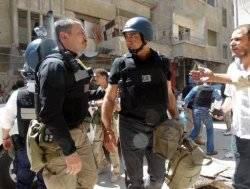The five permanent UN Security Council members have begun talks on a Western-drafted UN Security Council resolution to eliminate Syria's chemical weapons.
The discussion of the draft resolution to be put before the 15-nation Security Council was thwarted by disagreements over the wording of the proposal as American, British, French, Russian and Chinese diplomats met in New York on Tuesday.
Nearly an hour of initial talks ended with an agreement to meet again on Wednesday, diplomats said.
It remained unclear when a vote on the resolution could take place, UN diplomats said.
The US-British-French draft is intended to support an American-Russian deal reached in Geneva last Saturday calling for Syria to account for its chemical weapons within a week and for the removal and destruction of the arsenal by mid-2014.
However, France and Russia clashed over a French text which included a demand for action under Chapter VII of the UN Charter, which can authorize both the use of force and non-military measures, if Bashar al-Assad does not stick to the US-Russian plan.
'Provocation'
Britain, France and the US are in favor of a strong resolution against Syria.
But Sergey Lavrov, Russian foreign minister, who agreed a deal on Saturday with his US counterpart John Kerry to dismantle and destroy Syria's chemical arms stockpile by mid-2014, is opposed to a resolution that is under the chapter of the UN charter that allows the use of force.
"The resolution of the Security Council will not contain any reference to Chapter VII," Lavrov said after the meeting as he protested the Assad regime's innocence in the chemical attack.
"We have the most serious reasons to suggest that this was a provocation.
"Some of our partners have stated dogmatically that only the regime could use chemical weapons ... but the truth should be ascertained."
However, US President Barack Obama said on Tuesday that the UN report on the chemical attack helped "change the international dynamic" on the issue.
"When you look at the details of the evidence they present - it is inconceivable that anybody other than the regime used" the chemical weapons, Obama said in an interview on the Spanish language Telemundo network.
He said there would ultimately need to be a political transition in Syria in which Assad gave up power in the wake of a deal aimed at gaining international control of Syrian chemical weapons.
"Keep in mind that it's very hard to imagine that civil war dying down if in fact Assad is still in power," Obama said.
Kerry insisted on Tuesday that the US-Russian agreement for Syria to hand over its chemical weapons must be backed by a United Nations resolution with the teeth to force compliance from President Bashar al-Assad.
"That will happen only with the United Nations passing a strong resolution," Kerry said after a closed-door briefing on the Geneva talks with members of the Senate Foreign Relations Committee in Washington.
"It will happen with the enforcement of the world, with Russia standing by us in this effort, and it will happen, finally, because Assad lives up to what he has agreed to do.
"It is important that that threat of force stay on the table in order to guarantee the compliance of the Assad regime. So we will continue to press this issue."
Israel, Syria's neighbor, shifted from its non-committal public stance on Tuesday and said it wanted to see Assad toppled.
PHOTO CAPTION
UN arms experts inspect a site suspected of being hit by chemical weapons in a Damascus suburb on August 28, 2013.
Aljazeera


 Home
Home Discover Islam
Discover Islam Quran Recitations
Quran Recitations Lectures
Lectures
 Fatwa
Fatwa Articles
Articles Fiqh
Fiqh E-Books
E-Books Boys & Girls
Boys & Girls  Articles
Articles










